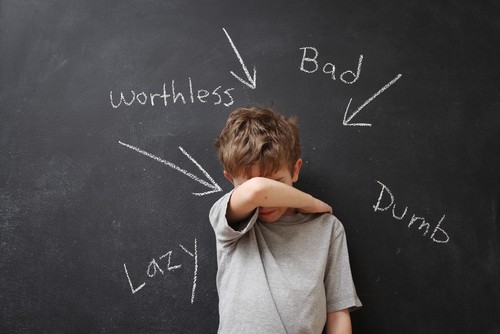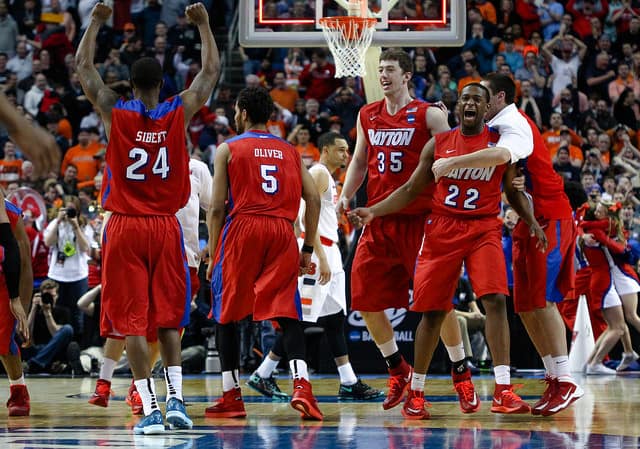Ok, show of hands: who filled out an NCAA Tournament Bracket? How is it looking now? Well I know it’s not perfect since Brad Binder’s bracket was the last one to fall. My own bracket is totally shot to pieces, and my alma mater, the Billikens of Saint Louis University, was eliminated on Saturday. I don’t know about you, but it’s got me feeling like a loser.
Loser: that’s a dangerous word to throw around, especially in the United States. An Italian professor once told a friend of mine that the worst insult to an American is to call him or her a “loser.” Based on his experience, it’s worse than using profanity or calling an American “ugly,” “fat,” or “lazy” to say nothing of the stupidity of “yo mamma” jokes. None of those insults carry the strength of being called a “loser.” The point is clear: Americans want to win. We value success and the standards that we use to measure “winning” become very important.
How do we do it? How do we measure success?
Generally speaking, we equate sports success with championships. The success of players, coaches and teams tends to be measured by the amount of championships they have won. Granted there are Hall of Fame players and coaches who have never won championships, but that’s usually a stain on their record. And when we chose among the best, we often count their titles. It comes up when we compare sports figures like Manning and Brady, or LeBron and Jordan.
Considering how seriously we weigh championships, I was surprised when I started reflecting on the variety of ways we use to determine a champion. The methods are far more diverse than you might expect and shockingly arbitrary.
We can start with NCAA college basketball since the tournament is in full swing. The format that we are familiar with began relatively recently in 1985 with 64 teams. It is a single-elimination tournament, so you have one must-win game to determine if you advance to the next round. To win the tournament, a team has to win six consecutive games against six different teams, progressing from the round of 64, through the Sweet Sixteen and Final Four on their way to a championship.

The winning shot
Brocreative/ Shutterstock
Professional basketball (the NBA) on the other hand utilizes playoff series to determine the champion. Two teams play a best-of-seven series, with the first team to win four games advancing to the next round. Think about how different this is than the NCAA tournament: a team has to win 16 games against four different opponents. There is far more room for error, with a team able to accumulate as many as 12 losses on their way to a championship. It doesn’t carry the stress of a must-win, single-elimination tournament, but the champion has to win more than twice as many games as the NCAA winner.
How striking is the difference between collegiate and professional basketball since it is the exact same sport. Talk about vastly different ways of determining a champion!
Not impressed? If this difference doesn’t seem that drastic to you, consider how the English Premier League (soccer, or “football” depending on where you come from) determines its champion. Each team plays two regular season games against every other team in the league. At the end of the season, the team with the best record wins the league. That’s right: no playoffs!
Imagine applying that to American sports leagues. It’s actually remarkable how rarely the team with the best regular season record wins the league championship. Scouring over the NBA regular season standings and comparing it to the playoff winner leads to some surprising observations. Michael Jordan, winner of6 NBA titles, only finished with the best record three times in his career. Kobe Bryant, who owns five championship rings, finished with the best record just once.
How about the surprises in NCAA Basketball? If we take the team ranked number one in the final regular season poll, there are plenty of unexpected results. Gonzaga, Illinois and Stanford would all have titles in the last decade, and Ohio State would have two. UConn, which claims multiple tournament wins, would have zero titles. Sorry if you picked Florida to win your bracket this year: only two teams in the last twenty years finished number one in the last poll and then won the tournament (Duke 2001, Kentucky 2012).

A Winner and a Loser
BlueSkyImage/ Shutterstock
So which is the greater measure of sports success? A single-elimination tournament? A playoff series? Regular season records? It seems to depend on the league and its own history. And yet we let these arbitrary measurements of success carry so much weight!
* * *
In America we value the thrill of the playoffs over the sustained success of a regular season. Judging by the widespread interest in March Madness, it seems like the general population also favors the thrill and excitement of a one-and-done tournament like NCAA basketball over a back-and-forth playoff series that can take two weeks to finish like the NBA Playoffs. We crave the thrilling moments of do-or-die, instant classics.
If that’s the way we feel about sports, I wonder if this mindset translates into our self-assessment of success in our lives.
In tournaments and playoffs, there is only one winner. Every other team goes home a loser. As a Broncos fan, I felt this acutely after the Super Bowl. I took very little consolation over being one of the only two teams to make the Super Bowl. We were “losers” that day. There are some nuances to this within the sports world. Take the Olympics, for example: the top three performers win medals. Still, many are driven to win a gold medal and consider that the only measure of success.
I was captivated by the story of American mogul skier, Hannah Kearney. She won the gold medal in 2010 in Vancouver and was heavily favored to repeat this year in Sochi. She was dominating the event and carried the highest scores throughout the competition. However, in the finals, she made one mistake: her feet became separated as she hit the moguls after her first jump. It was a split-second mistake. But in a sport that is measured so precisely, one mistake was enough. The scoring result left her with the bronze medal.
Immediately after her final race, she was interviewed at the bottom of the mountain. She was clearly emotional and showed a sense of disappointment and shock. Turning 27 years old, Hannah reflected on the possibility that this was her last Olympics, and that the best of her athletic career was behind her. She caught further media attention with her post-race tweet, “Bronze feels a lot like a broken heart.”
* * *
When first place is all that matters, life is left with a lot of losers. If you ain’t first, you’re last! This Will Ferrell/Ricky Bobby tagline is funny precisely because it echoes true of the expectations we place on ourselves.
I know that I have the tendency to measure myself against others. No matter how hard I try, I do it all the time. For example, I track the states and countries that I have been too, often comparing them to others. In my travels, I have met amazing people from across the country and around the world. And one thing amazes me: I can always find someone who has traveled more than me. If I’m not first, I must be last…
Isn’t this “keeping-up-with-the-Joneses”-syndrome? This happens in our workplace and among friends and neighbors all the time. Who has the highest salary? The biggest TV? The nicest car? The most expensive house? We can get caught up with this in our academics and our self-image. Who got the best grade? Who goes to the best school? Who has the thinnest waist? The trendiest clothes? The biggest muscles?

“If you measure success by having the most, you’re going to spend a lot of time feeling like a loser.”
Suzanne Tucker/ Shutterstock
I hate to break it to you, but you’re always going to find someone who has more. If there is only one champion, then there are a whole lot of losers. If you measure success by having the most, you’re going to spend a lot of time feeling like a loser.
* * *
There has to be better way. Success has to be about more than winning or losing. It has to be about more than having the most or being the best.
It is hard to look at the Gospels and apply our American mentality of success. Just think about Jesus: He didn’t make a lot of money or own many possessions in his life. He didn’t have a particularly big following during his life (the crowds cheered to save Barabbas, not him). He was arrested and abandoned by his closest friends. And let’s not forget being middle-aged and still living with his parents. What a loser!
Can we say that Jesus lived a successful life? Not if we measure by winning or losing, or having the most or being the best. Maybe we need to find another measure. How about love? What if we measure our life by how we give and receive love?
Our measures of success are so often tied to the things that we do and the possessions we acquire. Why don’t we talk more about the person that we want to be? Why don’t we measure our success by the choices we make and the way we live our lives? Aren’t these are much more important than tracking places visited or comparing cars models or counting championship rings?
To find true success, we need to cultivate values in how we live our lives: values like humility, generosity and love. We need to live our vocations with joy and courage, whether we are students, business executives, teachers, athletes, parents, or priests. This is what success should be all about.
* * *
March Madness is nearing its end. Team after team has been eliminated. The wins accumulated during the season are irrelevant now. Each game matters. Win and advance, or lose and go home. Soon, only one team will remain: the champion. One champion and a tournament full of losers.
But I hope your team loses. And let’s face it, the odds are that it will. I hope your bracket falls apart. I hope you get to experience the feeling of being a loser. Know that you’re in good company.



